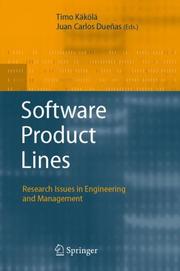| Listing 1 - 3 of 3 |
Sort by
|

ISBN: 9780387308524 0387002294 9780387002293 1441934723 9786613250612 0387308520 1283250616 Year: 2006 Publisher: New York, N.Y. : Springer,
Abstract | Keywords | Export | Availability | Bookmark
 Loading...
Loading...Choose an application
- Reference Manager
- EndNote
- RefWorks (Direct export to RefWorks)
This book presents a comprehensive survey of the Vesta system for software configuration management (SCM). Vesta, unlike other SCM systems, is specifically designed to handle very large software projects comprising tens of millions of lines of code and beyond. Researchers in the field of software engineering and specialists in the construction of software development tools will especially benefit from this work, but it will also appeal to those responsible for designing and deploying configuration management solutions for large software systems. Three important but hard-to-achieve properties lie at the heart of Vesta's unique approach to software configuration management: Every build is repeatable Every build is incremental Every build is consistent To realize these properties in a practical SCM system, Vesta provides a novel repository to store the versions of the files that make up an evolving software system and a flexible language for writing modular configuration descriptions that define how the system is put together. This book explains in depth these facilities and the suite of tools that supports them, together with a methodology for applying them in practice. Readers who seek more information about Vesta may download the entire system as well as other publications, reference documents, and user documentation from the Vesta home page at http://www.vestasys.org.
Computer Science. --- Software Engineering. --- System Performance and Evaluation. --- Software Engineering/Programming and Operating Systems. --- Computer science. --- Computer system performance. --- Software engineering. --- Informatique --- Génie logiciel --- 681.3*D29 --- Management: copyrights; cost estimation; life cycle; productivity; programming teams; software configuration management; software quality assurance; SQA (Software engineering)--See also {681.3*K63}; {681.3*K64} --- Information Technology --- Software Engineering --- Software configuration management. --- Software configuration management --- Engineering & Applied Sciences --- Computer Science --- 681.3*D29 Management: copyrights; cost estimation; life cycle; productivity; programming teams; software configuration management; software quality assurance; SQA (Software engineering)--See also {681.3*K63}; {681.3*K64} --- Computer software configuration management --- Computer system failures. --- Computers. --- Application software. --- Theory of Computation. --- Computer Appl. in Administrative Data Processing. --- Configuration management --- Information theory. --- Information systems. --- Computer software engineering --- Engineering --- Communication theory --- Communication --- Cybernetics --- Computer failures --- Computer malfunctions --- Computer systems --- Failure of computer systems --- System failures (Engineering) --- Fault-tolerant computing --- Application computer programs --- Application computer software --- Applications software --- Apps (Computer software) --- Computer software --- Automatic computers --- Automatic data processors --- Computer hardware --- Computing machines (Computers) --- Electronic brains --- Electronic calculating-machines --- Electronic computers --- Hardware, Computer --- Machine theory --- Calculators --- Cyberspace --- Failures

ISBN: 1280803762 9786610803767 3540332537 3540332529 364206986X 9783540332527 Year: 2006 Publisher: Berlin: Springer,
Abstract | Keywords | Export | Availability | Bookmark
 Loading...
Loading...Choose an application
- Reference Manager
- EndNote
- RefWorks (Direct export to RefWorks)
Between July 1999 and June 2005 a group of European companies, research institutes, and universities executed the EUREKA-ITEA projects ESAPS, CAFÉ, and FAMILIES on the topic of product line engineering. The projects originated from the need of the industry to improve software engineering performance by organizing product development in product lines. The results obtained within the projects have been implemented in several large industries (e.g., automotive, e-business, medical systems, and mobile phones). They involve a radical shift in software construction and production. The most important research results of the projects are collected in this book. Product line engineering was already applied within industry in the 1980s and presumably earlier. In the 1980s, good architects in many telecommunications c- panies based their architectures on the ideas of David Parnas, who published on the subject of program families . They were facilitated by the CHILL language widely used by the telecommunications companies. This language deploys the same modularity principles as the Modula programming language family. Modularity is a crucial ingredient for implementing systems with a component-based architecture. Being able to compose the products of components is an important mechanism in all product line architectures. In the 1990s, the product line ideas started to gain ground in other industries. Around 1995, the company experiences reached the academia and since then people in companies and academia have collaborated widely on this subject. The ESAPS, CAFÉ, and FAMILIES projects manifest an institutionalized form of this collaboration.
Computer software --- Software engineering. --- Development. --- Computer science. --- Management. --- Industrial management. --- Information technology. --- Business --- Economic policy. --- Computer Science. --- Software Engineering. --- IT in Business. --- Innovation/Technology Management. --- R & D/Technology Policy. --- Computer software engineering --- Engineering --- Economic nationalism --- Economic planning --- National planning --- State planning --- Economics --- Planning --- National security --- Social policy --- Electronic data processing --- IT (Information technology) --- Technology --- Telematics --- Information superhighway --- Knowledge management --- Business administration --- Business enterprises --- Business management --- Corporate management --- Corporations --- Industrial administration --- Management, Industrial --- Rationalization of industry --- Scientific management --- Management --- Industrial organization --- Administration --- Industrial relations --- Organization --- Informatics --- Science --- Data processing. --- Development of computer software --- Software development --- Information Technology --- Software Engineering --- Software engineering --- 681.3*D210 --- 681.3*D211 --- 681.3*D213 --- 681.3*D21 --- 681.3*D29 --- 681.3*K63 --- 681.3*K63 Software management: software development; software selection; software maintenance --- Software management: software development; software selection; software maintenance --- 681.3*D210 Design: methodologies; representation (Software engineering) --- Design: methodologies; representation (Software engineering) --- 681.3*D29 Management: copyrights; cost estimation; life cycle; productivity; programming teams; software configuration management; software quality assurance; SQA (Software engineering)--See also {681.3*K63}; {681.3*K64} --- Management: copyrights; cost estimation; life cycle; productivity; programming teams; software configuration management; software quality assurance; SQA (Software engineering)--See also {681.3*K63}; {681.3*K64} --- 681.3*D21 Requirements/specifications: languages; methodologies; tools (Software engineering)--See also {681.3*D31} --- Requirements/specifications: languages; methodologies; tools (Software engineering)--See also {681.3*D31} --- Development --- Software architectures: data abstractio, domain-specific architectures, information hiding, languages (e.g. description, interconnection, definition), patterns (e.g. client/server, pipeline, blackboard) --- Reusable software: domain engineering; reusable libraries; reuse models --- Business—Data processing. --- Computer software - Development

ISBN: 9783540692614 3540692614 9786610853076 1280853077 3540692622 Year: 2007 Publisher: Berlin, Germany ; New York, New York : Springer,
Abstract | Keywords | Export | Availability | Bookmark
 Loading...
Loading...Choose an application
- Reference Manager
- EndNote
- RefWorks (Direct export to RefWorks)
Grid computing has become a topic of significant interest in the scientific community as a means of enabling application developers to aggregate resources scattered around the globe for solving large-scale scientific problems. This monograph addresses four critical software development aspects for the engineering and execution of applications on parallel and Grid architectures. A new directive-based language called ZEN is proposed for compact specification of wide value ranges of interest for arbitrary application parameters, including problem or machine sizes, array or loop distributions, software libraries, interconnection networks, or target execution machines. Based on the ZEN language, a novel experiment management tool called ZENTURIO is developed for automatic experiment management of large-scale performance and parameter studies on parallel and Grid architectures. This tool has been validated with respect to functionality and usefulness on several real-world parallel applications from various domains, including theoretical chemistry, photonics, finances, and numerical mathematics. Depending on the ZENTURIO experiment management architecture a generic optimization framework is built up that integrates general-purpose meta-heuristics for solving NP-complete performance and parameter optimization problems in an exponential search space specified using the ZEN experiment specification language. Finally a timely approach is proposed for modeling and executing scientific workflows in dynamic and heterogeneous Grid environments, introducing an abstract formal model for hierarchical representation of complex directed graph-based workflows. Thus this monograph contributes to various research areas related to integrated tool development for efficient engineering and high performance execution of scientific applications in Grid environments.
Computational grids (Computer systems) --- Grilles informatiques --- Computational grids (Computer systems). --- Computer systems. --- Electronic books. -- local. --- Electrical & Computer Engineering --- Engineering & Applied Sciences --- Computer Science --- Telecommunications --- Information Technology --- Computer Science (Hardware & Networks) --- 681.3*D29 --- 681.3*G18 --- 681.3*K6 --- Grid computing --- Grids, Computational (Computer systems) --- Computer systems --- Cyberinfrastructure --- Management: copyrights; cost estimation; life cycle; productivity; programming teams; software configuration management; software quality assurance; SQA (Software engineering)--See also {681.3*K63}; {681.3*K64} --- Partial differential equations: difference methods; elliptic equations; finite element methods; hyperbolic equations; method of lines; parabolic equations (Numerical analysis) --- Management of computing and information systems: economics --- 681.3*K6 Management of computing and information systems: economics --- 681.3 *G18 Partial differential equations: difference methods; elliptic equations; finite element methods; hyperbolic equations; method of lines; parabolic equations (Numerical analysis) --- 681.3*D29 Management: copyrights; cost estimation; life cycle; productivity; programming teams; software configuration management; software quality assurance; SQA (Software engineering)--See also {681.3*K63}; {681.3*K64} --- ADP systems (Computer systems) --- Computing systems --- Systems, Computer --- Computer science. --- Computer communication systems. --- Software engineering. --- Operating systems (Computers). --- Computers. --- Computer logic. --- Computer Science. --- Theory of Computation. --- Computer Science, general. --- Computer Communication Networks. --- Operating Systems. --- Software Engineering. --- Logics and Meanings of Programs. --- Computer science logic --- Logic, Symbolic and mathematical --- Automatic computers --- Automatic data processors --- Computer hardware --- Computing machines (Computers) --- Electronic brains --- Electronic calculating-machines --- Electronic computers --- Hardware, Computer --- Cybernetics --- Machine theory --- Calculators --- Cyberspace --- Computer operating systems --- Computers --- Disk operating systems --- Systems software --- Computer software engineering --- Engineering --- Communication systems, Computer --- Computer communication systems --- Data networks, Computer --- ECNs (Electronic communication networks) --- Electronic communication networks --- Networks, Computer --- Teleprocessing networks --- Data transmission systems --- Digital communications --- Electronic systems --- Information networks --- Telecommunication --- Electronic data processing --- Network computers --- Informatics --- Science --- Operating systems --- Distributed processing --- 681.3 *G18 --- Information theory. --- Logic design. --- Design, Logic --- Design of logic systems --- Digital electronics --- Electronic circuit design --- Logic circuits --- Switching theory --- Communication theory --- Communication
| Listing 1 - 3 of 3 |
Sort by
|

 Search
Search Feedback
Feedback About UniCat
About UniCat  Help
Help News
News